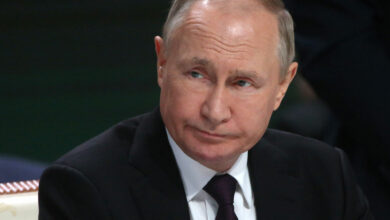The Qadhafi regime has crumbled, reminding us once again that no regime can rely on batons and bullets to cement its legitimacy. Now that the fetters of repression have been shed, it is time to stitch together a country divided by four decades of dictatorship.
For this to be done, the Libyan people must seize the opportunity to restore justice and kick-start a democratic transition. This won’t be easy and Libya cannot do this alone. The European Union should reach out to the new Libya, as a friend and strategic partner.
For more than forty years – Qadhafi seized power the same year that Neil Armstrong landed on the moon – Libyans have been robbed of their freedom and dignity. Over the past six months, Qadhafi’s brutal regime showed the world its true colours. Thousands of Libyans have been killed since protests began. Many more have been jailed and battered. This is a regime which pledged to hunt protestors down like rats and fight its own people “to the last bullet.”
Qadhafi and his inner circle must be brought to face justice. But Libya must also confront past mistakes. Not in order to wage a vendetta against the outgoing regime but to establish a fresh start. Libyans could learn from the Eastern European experience of dismantling repressive security and military structures. This means facing up to the inevitable moral quandaries associated with the opening up of secret police files. Newly liberated Arab capitals such as Tripoli should start the internal reconciliation process.
Autocrats were toppled in Egypt, Tunisia and Libya, as in Eastern Europe, because the people lost its fear and military commanders, reading the runes, changed sides. But the revolution has to go one stage further: the machinery of repression has to be dismantled. The judicial system has to be reformed, quickly and thoroughly. Without justice and intelligent leadership Libya risks going down the path of post-Saddam Iraq or the even the prolonged lawlessness of Somalia.
Lasting justice is only possible if democratic structures and values are able to take root. The next few months will be crucial for Libya. In the short-term, it is vital that the Transitional National Council (TNC) rises up to the challenge of maintaining law and order and getting essential services up-and-running again. Looking ahead, the TNC needs to take the lead and help steer the country towards a democratic transition that is both just and inclusive.
The EU has an important role to play in helping Libyans with the mechanics of democracy. The EU and Libya should now build a new kind of partnership – one oriented more towards values and people. The European Parliament, for example, should continue supporting Libyans in their efforts to build a pluralist political landscape and help prepare for elections to come. The EU has a responsibility to protect democracy.
The next few months will require patience and sober expectations. In his "Letters from Freedom", long-time Polish dissident Adam Michnik wrote in praise “of the ordinary.” For the first time in many years Libya has a chance to become a ‘normal’ country again. This is what Libya should strive for.
Qadhafi’s demise should send a strong message to the entire region: no leader will be able to continue his reign through the brutal use of force. The fall of Qadhafi is writing on the wall for Bashar al-Assad, Ali Abdullah Saleh and other dictators at bay. They should listen to the demands of their people and step aside.
The voice of the people demanding democratic change is loud and clear. The EU cannot – and must not – remain indifferent to these calls. Europe needs to help its eastern and southern neighbours in their fight for human dignity, freedom and democracy. For the EU, stability is essential. But a democratic neighbourhood is as important as a stable neighbourhood.
The events of the Arab Spring were a wake-up call for everyone, including Europe. The turmoil nudged the EU into becoming a more active force which upholds the values on which it was built.
Although the international community will be there to help, Libya’s future now lies in the grasp of the Libyan people. Libyans should be proud of what they have achieved. It is important that this pride and newfound sense of dignity should be passed on, like a birthmark, to the next generation of Libyans.
Philip Boyes is a speechwriter for a senior EU politician.




